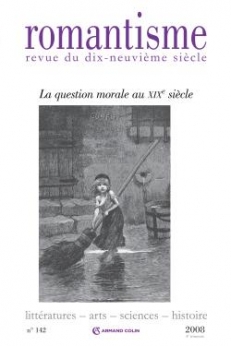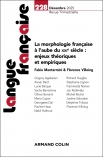
Romantisme n° 142 (4/2008)
Pour acheter ce numéro, contactez-nous
Recevez les numéros de l'année en cours et accédez à l'intégralité des articles en ligne.
Vu la place importante accordée à la description des us et coutumes régionaux dans les romans rustiques de George Sand, la contribution sandienne à la construction du national a été considérée avant tout sous l’angle du patrimoine, « du riche legs de souvenirs ». C’est de l’autre facette de la contribution sandienne au processus de formation identitaire, celui du « plébiscite de tous les jours », que traite cet article. L’oeuvre postérieure à 1848 est présentée ici comme l’illustration du projet politique qui la porte, c’està- dire du désir de transformer la France en une vraie république. Mettre en relation une oeuvre littéraire où domine la religion de l’amour et une oeuvre politique qui s’interroge sur les moyens de faire naître le « consentement libre et spontané de tous » à la nation permet de faire apparaître l’importance du sentiment d’appartenance nationale et du nationalisme dans l’oeuvre de maturité de George Sand.
Given the significance of regional customs and traditions in George Sand’s rustic novels, the novelist’s contribution to the national construct has been considered mostly through the angle of patrimony – a “rich legacy of memories”. The point of this essay is to examine the other facet of Sand’s contribution to the process of identity formation, that of the “daily plebiscite”. The work published after the 1848 revolution is presented here as illustration of the political project in which it originated, i.e., of the desire to transform France into a true republic. Establishing a relation between a literary work in which the religion of love dominates and a political project focused on the means of eliciting everyone’s “free and spontaneous consent” to the nation makes it possible to see how central nationalism and feelings of national belonging are in George Sand’s later work.

